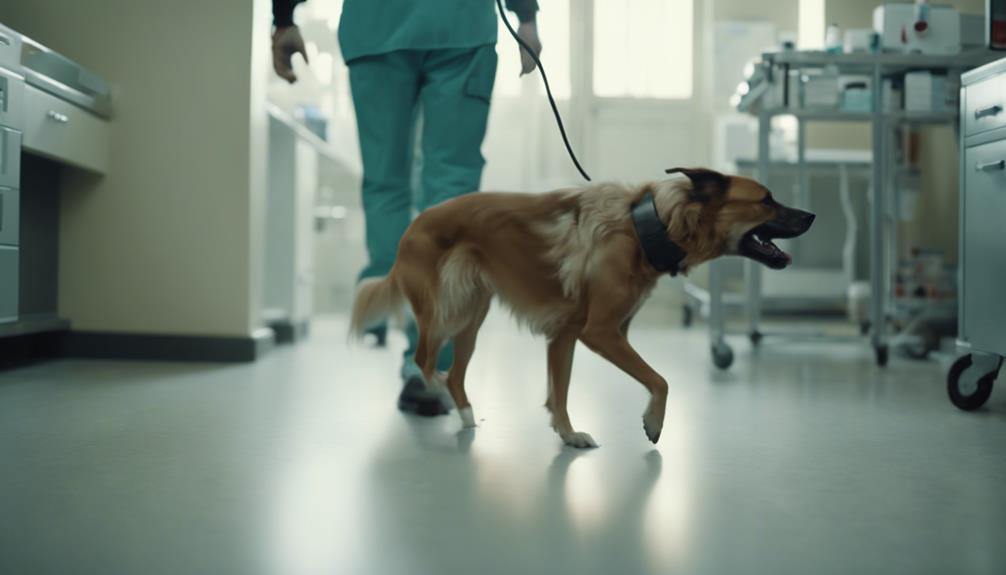Within the realm of veterinary therapeutics, Carprofen emerges as a pivotal agent in managing canine pain and inflammation, particularly in conditions like arthritis and post-operative recovery. As a non-steroidal anti-inflammatory drug, its targeted inhibition of COX-2 sets it apart in mitigating gastrointestinal concerns.
However, the landscape of its uses, potential side effects, dosage intricacies, and precautionary measures unveils a complex tapestry that demands meticulous navigation for optimal outcomes in canine care. Understanding these facets not only ensures the responsible administration of Carprofen but also underscores the significance of informed decision-making in safeguarding our furry companions' well-being.
Key Takeaways
- Carprofen is a NSAID used in dogs for pain relief in conditions like arthritis and post-surgery recovery.
- Common side effects include GI upset, while blood tests are recommended to monitor liver and kidney function.
- Dosage guidelines recommend administration with food, typically at 2mg per pound of body weight daily.
- Overdosing on carprofen can lead to serious symptoms, necessitating immediate veterinary attention.
Importance of Carprofen for Dogs
The use of carprofen for dogs is paramount in alleviating pain and inflammation associated with various conditions, making it a crucial medication in veterinary care.
Carprofen, a non-steroidal anti-inflammatory drug (NSAID), is commonly prescribed for ailments like arthritis, elbow dysplasia, hip dysplasia, post-surgery recovery, injuries, and infections.
By acting as a selective COX-2 inhibitor, carprofen protects the gastrointestinal tract while providing effective pain relief with fewer gastrointestinal side effects compared to other NSAIDs. This medication is preferred over alternatives for certain dogs due to its efficacy and tolerability.
Veterinarians rely on carprofen to improve the quality of life for dogs experiencing discomfort, ensuring their well-being and comfort during treatment and recovery.
Uses of Carprofen in Canines
Carprofen serves as a valuable medication in veterinary care, exhibiting efficacy in alleviating pain and inflammation in canines with conditions such as arthritis, elbow dysplasia, hip dysplasia, post-surgery recovery, injuries, and infections.
- Enhances quality of life for dogs by reducing pain and swelling.
- Restores mobility and comfort, enabling a more active lifestyle.
- Facilitates quicker recovery from surgical procedures, promoting healing.
- Improves overall well-being and happiness of furry companions.
Understanding Side Effects of Carprofen

Exploring the potential adverse effects of carprofen in dogs is essential for ensuring safe and effective pharmacological management. Common side effects of carprofen include gastrointestinal upset such as vomiting, diarrhea, loss of appetite, and gastrointestinal ulceration.
Additionally, there is a risk of black, tarry stools, liver and kidney damage, and prolonged bleeding. Central nervous system issues are rare but should be monitored.
Regular blood tests are advisable before and during carprofen administration to assess liver and kidney function. Understanding and recognizing these side effects can aid in prompt intervention and adjustment of treatment plans to ensure the well-being of dogs receiving carprofen therapy.
Precautions When Using Carprofen
Understanding the precautions associated with the use of carprofen in dogs is crucial for ensuring the safe and effective management of pain and inflammation in canine patients. When using carprofen, consider the following emotional pointers:
- Compassion: Be attentive to your dog's response to the medication, showing care and empathy towards any signs of discomfort.
- Vigilance: Monitor your dog closely for any unusual symptoms or changes in behavior while on carprofen.
- Responsibility: Follow the dosage guidelines meticulously and avoid any deviations to prevent adverse effects.
- Consultation: Regularly consult with your veterinarian to discuss the ongoing efficacy and safety of carprofen for your dog's specific condition.
Dosage Recommendations for Carprofen

When administering carprofen to dogs, adherence to appropriate dosage guidelines is essential to ensure safe and effective management of pain and inflammation. The typical dosage of carprofen for dogs is around two milligrams per pound of body weight daily, usually split into two doses 12 hours apart. It is commonly administered orally as a pill with food.
Carprofen is available in tablet forms of 25, 75, and 100 milligrams. It is important not to exceed the prescribed dosage, as overdosing can lead to severe symptoms and complications. Additionally, carprofen should not be given concurrently with other NSAIDs or corticosteroids to prevent adverse reactions.
Proper dosing and adherence to veterinary instructions are key to maximizing the benefits of carprofen therapy while minimizing risks.
Administering Carprofen to Dogs
Proper administration of carprofen to dogs is crucial for ensuring the medication's effectiveness and safety in managing pain and inflammation. To make sure your furry companion receives the right care, follow these emotional guidelines:
- Compassion: Administer the medication with care and gentleness to show your love and concern for your dog's well-being.
- Responsibility: Stay vigilant with dosing schedules and observe any unusual reactions to guarantee your dog's health and comfort.
- Trust: Build a trusting relationship with your veterinarian to seek guidance and address any concerns about your dog's treatment.
- Empathy: Put yourself in your dog's paws to understand the importance of providing relief from pain and discomfort through proper medication administration.
Different Forms of Carprofen Available

Various formulations of carprofen are available to cater to different administration needs and preferences for managing pain and inflammation in dogs. Carprofen is commonly found in tablet form with strengths ranging from 25 to 100 milligrams, making it convenient for dosing based on the dog's weight and condition.
Additionally, there are injectable forms of carprofen that can be administered by a veterinarian in clinical settings, providing an alternative for dogs who have difficulty taking oral medications or need immediate pain relief. These different forms of carprofen offer flexibility in treatment options, allowing veterinarians to choose the most suitable form based on the dog's specific requirements and circumstances.
Risks of Overdosing on Carprofen
Excessive administration of carprofen in dogs poses a significant risk of adverse effects and necessitates vigilant dosing adherence to prevent potential overdosing complications. Overdosing on carprofen can have severe consequences, including gastrointestinal issues, weakness, seizures, and kidney failure.
To evoke emotion in the audience, consider the following:
- Fear: The thought of your beloved pet experiencing seizures due to an accidental overdose can be terrifying.
- Guilt: Knowing that a simple dosing mistake could lead to significant harm may induce feelings of guilt and regret.
- Anxiety: The uncertainty of managing a carprofen overdose situation can create anxiety and distress for pet owners.
- Urgency: Immediate veterinary attention is crucial in overdose cases, emphasizing the urgency and importance of proper dosing.
Managing Carprofen Overdose Situations

In cases where accidental overdosing of carprofen in dogs occurs, prompt and appropriate actions are essential to mitigate potential harm and ensure the well-being of the affected pet. If an overdose is suspected, contacting a veterinarian or a poison control center is crucial for guidance on the next steps.
In instances of severe overdose symptoms such as weakness, tremors, seizures, or kidney failure, immediate veterinary attention is necessary. Owners should provide as much information as possible about the quantity and timing of the medication ingested.
To prevent overdose incidents, it is vital to store medications securely out of reach of pets and strictly adhere to the prescribed dosage guidelines. Regular monitoring for signs of overdose can help in early detection and intervention.
Identifying Signs of Carprofen Overdose
To recognize potential signs of carprofen overdose in dogs, vigilant observation of their behavior and physical condition is crucial. Signs of carprofen overdose may include:
- Vomiting: Persistent or severe vomiting can indicate a potential overdose and should be taken seriously.
- Abdominal Pain: Dogs experiencing abdominal discomfort or pain may be showing signs of carprofen toxicity.
- Diarrhea: Changes in the frequency or consistency of bowel movements can be a red flag for overdose.
- Weakness or Tremors: Notice any unexplained weakness or tremors in your dog, as these could be indicative of an overdose situation.
Monitoring your dog closely for these signs and seeking immediate veterinary assistance if any are present is vital in preventing serious complications from carprofen overdose.
Considering Other NSAIDs for Dogs

Considering alternative NSAIDs for dogs to manage pain and inflammation beyond carprofen involves evaluating their efficacy and safety profiles in accordance with individual canine health needs. Some other commonly used NSAIDs for dogs include meloxicam, firocoxib, and deracoxib. Here is a comparison table highlighting key differences:
| NSAID | Efficacy | Safety Profile |
|---|---|---|
| Carprofen | High | Moderate |
| Meloxicam | High | Moderate |
| Firocoxib | High | Moderate |
| Deracoxib | High | Moderate |
Each NSAID has its own unique characteristics and considerations, so consulting with a veterinarian is essential to determine the most suitable option based on the specific needs and health status of your dog.
Monitoring Your Dog's Response to Carprofen
How can you effectively assess your dog's reaction to carprofen treatment? Monitoring your dog's response to carprofen is crucial to ensure their well-being. Here are four key aspects to pay attention to:
- Behavioral Changes: Observe for any alterations in your dog's behavior, such as increased lethargy, restlessness, or changes in appetite.
- Physical Symptoms: Look out for signs like vomiting, diarrhea, changes in thirst or urination, and any unusual bleeding or bruusing.
- Mobility: Monitor your dog's mobility and comfort levels, noting any improvements or worsening of their condition.
- Regular Veterinary Check-ups: Schedule regular check-ups with your vet to evaluate your dog's response to carprofen and address any concerns promptly.
Conclusion
In conclusion, Carprofen plays a crucial role in managing pain and inflammation in dogs, particularly in conditions like arthritis and post-operative discomfort. Understanding its uses, potential side effects, dosage guidelines, and precautions is essential for responsible usage.
By monitoring your dog's response to Carprofen and being vigilant for signs of overdose, pet owners can ensure the well-being of their canine companions. Consider consulting with a veterinarian for tailored advice on NSAID usage in dogs.




